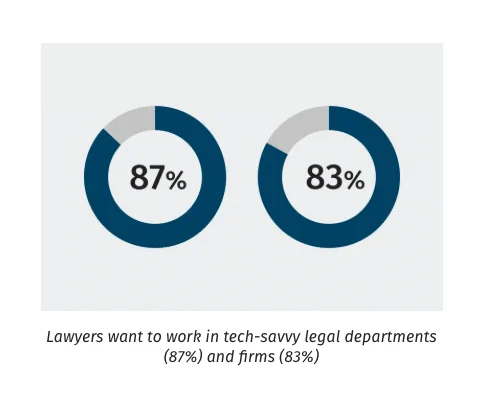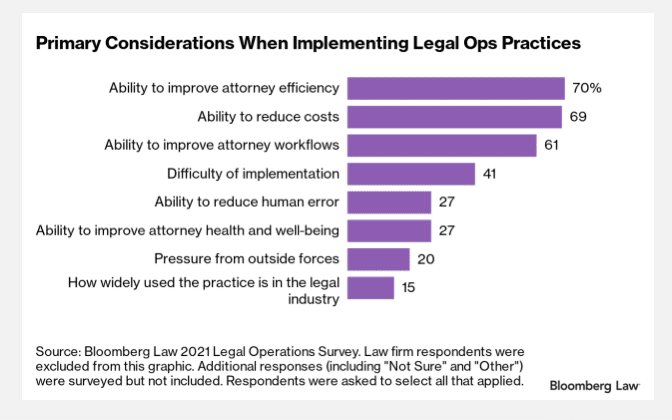Articles
7 Characteristics of a High-Performing Legal Team
May 8, 2023
Solution
Market Insights

As a leader in legal innovation, we have had the immense pleasure of helping corporate legal departments reflect, grow, and succeed in their legal operations. That experience has afforded us a unique understanding of the environments and characteristics that nurture a high-performing legal team.
Check out our list of seven key traits that fuel high performance in today’s corporate legal practice.
Key Takeaways
- Leadership prioritizes optimizing legal workflows and considers themselves a corporate strategic partner.
- Attorneys and staff in a high-performing legal team have well-defined roles and benefit from proactive talent retention strategies.
- The legal team leverages technology and multiple channels for more robust communication at all levels.
1. High Performing Legal Teams Care About Optimizing their Workflows
Producing quality legal work and advice to corporate stakeholders will always be the fundamental goal of a corporate legal department. However, high-performing legal teams also care about the operations and workflows that make their outputs effective and efficient to command the respect of c-suites and corporate boards. The concepts and goals that contribute toward effective work, while related to the law practice, focus more on the work’s administration and business-end. Areas where legal teams can always look to improve performance include:
- Using data analytics to forecast, track progress, and monitor for weaknesses.
- Legal spend analysis to make sure legal decisions and processes make financial sense.
- Knowledge management practices that give structure and stability to a legal team.
2. Attorneys and Staff Have Well-Defined Roles
Most GCs, legal officers, and attorneys can remember times in their jobs when it was unclear what their supervisors or clients expected from them on a matter. Sometimes, these moments provide an opportunity for individual growth, but they can just as easily create unnecessary risk.
High-performing legal teams balance this tension by giving attorneys and staff well-defined roles. Employee handbooks, performance reviews, memos, and other internal documents that establish a structure for individual roles could give your team confidence in their skill sets and empower them to escalate matters when necessary.
3. The General Counsel or Chief Legal Officer is a Strategic Corporate Partner
Another key trait of a legal team trending in the right direction is the degree of strategic input given to the general counsel, chief legal officer, or other senior counsel. Traditional corporate legal departments existed in a reactionary role to paper transactions, advise on corporate governance, and direct litigation to outside counsel.
In high-performing teams, corporate leaders recognize the value of collaborating with legal beforehand. The benefits can range from risk mitigation to the removal of key stakeholders’ surprise when legal issues arise.
4. The Team Leverages Technology to Perform Legal Operations Faster and Better
How your team implements and adopts new technology is a key measure of success for legal departments over the coming years. GCs that prioritize understanding how AI tools, contract management systems, and other technology add value to a legal team will be uniquely positioned to create an environment for growth.

Image Source https://www.wolterskluwer.com/en/know/future-ready-lawyer-2022
5. Robust Communication That Aids the Legal Team’s Knowledge Retention
Related to legal tech usage is a legal team’s communication. A modern legal department has a lot of parties and audiences that it must interact with to succeed, which likely includes the following:
- Inter-department communication: The members of the legal department, including attorneys, paralegals, assistants, contract managers, legal operation specialists, and compliance specialists.
- Inter-corporate communication: When working with other corporate members like the sales team, HR, production, R&D, c-suite, board of directors, etc.
- External communication: Vendors, outside counsel, ALSPs, opposing counsel, government regulatory agencies, etc.
Your legal department should have several communication methods based on the legal process and its sensitivity level. How your team communicates is about more than the appropriate use of email, phone calls, video chat, and other tools. It should also involve memos, file organization, contract template libraries, checklists, and more that are essential to knowledge management.
6. The General Counsel Considers Legal Spend Analysis in Decision-Making
The legal cost of achieving a desired outcome is often the second most important consideration behind the outcome itself. General counsels and chief legal officers that can effectively incorporate legal spend analysis into their decision-making will often command the respect of board members and other executives when justifying actions or recommendations. Some issues that legal spend analysis can help your legal team solve to achieve higher performance might include the following:
- Comparing the value of various outside counsel firms based on overall cost and outcome.
- Projecting settlement offers based on legal defense costs.
- Choosing between hiring additional FTE versus engaging an ALSP for flexible legal operation support.

Image Source https://news.bloomberglaw.com/bloomberg-law-analysis/analysis-trending-in-2022-for-in-house-legal-departments
7. You Prioritize Retaining Legal Talent and Have a Strategy in Place
Teams that incorporate many of the previously discussed items may notice that their retention numbers are better than other legal departments. Often, that is another motivating factor for chief legal officers because they know retaining top talent is key to successful performance.
A recent survey showed that only 33% of corporate lawyers felt their department was prepared to recruit and retain staff. Effective management through technology, communication, and other organizational structure contributes to the ability of attorneys and staff to feel their work has meaning and purpose.
A planned approach is essential for giving your legal talent that fulfillment in their role. This requires a combination of individual investment and standardized processes that promote growth opportunities and make legal staff feel like stakeholders in the company. Some examples include:
- Education and training benefits (e.g., conferences, trade shows).
- Collaborating on projects with teams outside the legal department.
- Establishing long-term plans to give your talent a roadmap for promotion and success.
Learn More About How Morae Can Help Your Legal Team
Morae is an ALSP that provides multiple key services to corporate legal departments using a carefully curated set of technology platforms and specialists. Whether flexible hiring support on upcoming litigation or spend analysis consultation, our team is here to give your legal team a custom solution.
Schedule a consultation today to learn more about our Morae can support your legal team.